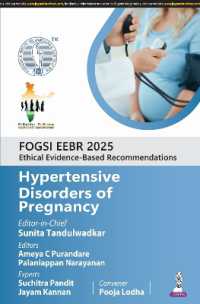Full Description
Written in association with the Federation of Obstetric and Gynaecological Societies of India (FOGSI), and with contributions from a multitude of recognised experts led by FOGSI (2025-2026) president Sunita Tandulwadkar; the Ethical Evidence-based Recommendations (EEBR) series provides clinicians with the latest updates and advances in the field, with each book focusing on a different subspecialty.
Preterm labour happens when regular contractions cause the cervix to open after week 20 and before week 37 of pregnancy. Preterm labour can result in a baby being born before 37 weeks of pregnancy - the earlier the delivery, the greater the health risks for the baby. Many premature babies need special care in a neonatal intensive care unit. They can also have long-term physical and mental health concerns.
This book provides clinicians with a comprehensive guide to the management of preterm labour, integrating the latest evidence with the ethical frameworks necessary for informed decision-making. The text begins with a thorough review of the pathophysiology and risk factors associated with preterm labour. The following chapters examine the various intervention options available for its management.
Other titles in the series include:
Antenatal Fetal Surveillance
Endometriosis
Fibroids
Genetics in Obstetrics and Gynaecology
Hyperglycemia in Pregnancy
Hypertensive Disorders of Pregnancy
Induction of Labour
Polycystic Ovary Syndrome
Postpartum Haemorrhage
Contents
1. Definition, Classification of Preterm Labor
2. Pathogenesis, Etiology, and Risk Factors
3. Prevention of Preterm Labor
4. Management of Preterm Labor
5. Magnesium Sulfate - Roles and Recommendations
6. Role of Tocolysis in Preterm Labor
7. Role of Corticosteroids
8. Preterm Prelabor Rupture of Membranes (PPROM)
9. Mode of Delivery in PPROM
10. Preterm Labor
11. Neonatal and Infantile Outcomes








